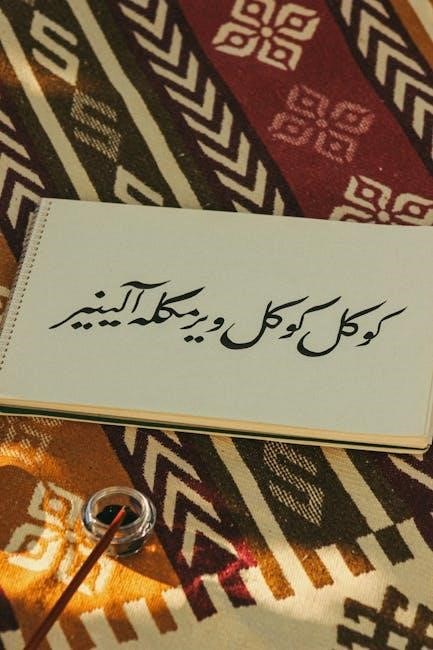Funny in Farsi is a heartfelt and humorous memoir by Firoozeh Dumas, exploring her journey growing up Iranian in America․ With wit and charm, it delves into cultural identity, family, and the immigrant experience, offering a relatable and engaging perspective on navigating two worlds․
Overview of the Memoir
Funny in Farsi is a captivating memoir by Firoozeh Dumas that recounts her experiences growing up as an Iranian immigrant in America․ The book is a collection of humorous and heartfelt stories that explore cultural differences, family dynamics, and the challenges of navigating two worlds․ Starting with her family’s move from Iran to California when she was just seven, Dumas shares anecdotes about her early impressions of America, her quirky family, and the struggles of fitting in․ Written with wit and warmth, the memoir offers a unique perspective on the immigrant experience, blending humor with poignant reflections on identity and belonging․
Author Firoozeh Dumas and Her Background
Firoozeh Dumas is an Iranian-American author, best known for her memoir Funny in Farsi․ Born in Abadan, Iran, she moved to California with her family at age seven․ Dumas’ unique background, blending Iranian heritage with American culture, shapes her writing․ She holds a degree in comparative literature and has worked as a writer and teacher․ Her work often explores themes of identity, immigration, and cultural differences, resonating with diverse audiences․ Dumas’ storytelling is marked by humor and warmth, making her a beloved voice in multicultural literature․

Themes and Tone of the Book
Funny in Farsi explores themes of cultural identity, immigration, and family, blending humor with heartfelt reflections on navigating Iranian and American cultures․ The tone is lighthearted yet profound․
Cultural Differences and Identity
Firoozeh Dumas’ memoir delves into the complexities of cultural differences and identity, recounting her experiences as an Iranian immigrant in America․ With humor, she highlights the challenges of adapting to a new culture, from language barriers to societal norms․ Her journey reflects the struggle to balance Iranian heritage with American life, creating a unique sense of self․ The book vividly portrays the nuances of cultural identity, offering a relatable and poignant perspective on what it means to belong to two worlds․ Through her storytelling, Dumas bridges the gap between cultures, making her experiences universally resonant․
Humor as a Coping Mechanism
Firoozeh Dumas uses humor as a powerful tool to navigate the challenges of cultural adaptation and identity․ Through witty anecdotes, she transforms awkward moments, like her first day of school in America, into relatable and laughable experiences․ Her ability to find humor in misunderstandings and language barriers highlights the resilience of her family and their determination to thrive in a new environment․ By sharing these stories, Dumas illustrates how humor becomes a universal language, bridging cultural gaps and offering a fresh perspective on the immigrant experience․ Her lighthearted approach makes the struggles of adapting to a new culture both endearing and inspiring․

The American Journey of Firoozeh’s Family

Firoozeh’s family immigrated from Iran to America, navigating cultural and social challenges․ Their journey, marked by resilience, humor, and a quixotic father, is a captivating tale of adaptation․
Early Immigration Experiences
Firoozeh Dumas’s family moved from Abadan, Iran, to Whittier, California, when she was just seven years old․ Her first impressions of America were marked by curiosity and cultural shock, as she navigated a new language and customs․ The family’s relocation was driven by her father’s engineering career, and they quickly embraced their new life while maintaining strong Iranian roots․ Firoozeh’s early experiences, such as her first day of school and struggles with pronunciation, highlight the challenges of immigration․ Despite these hurdles, her family’s resilience and humor laid the foundation for their American journey, shaping Firoozeh’s unique perspective on identity and belonging․
The Role of Family in the Memoir
In Funny in Farsi, family plays a central role in shaping Firoozeh Dumas’s identity and experiences․ Her engineer father, a dreamer with a quirky sense of humor, and her practical mother form the core of her supportive yet unconventional family․ The memoir portrays the tight-knit bond between Firoozeh and her siblings, as well as the challenges they face together as immigrants․ Her family’s resilience, humor, and love provide a sense of belonging amidst cultural shifts․ Through anecdotes about her father’s optimism and her mother’s steadfastness, Dumas illustrates how her family’s dynamic influenced her journey of self-discovery and adaptation in America, blending Iranian traditions with American life․ The family’s unity serves as a cornerstone of her story․

Key Chapters and Stories
Funny in Farsi features engaging chapters that highlight humorous and insightful anecdotes about Firoozeh’s life, blending cultural differences with universal experiences of growing up Iranian in America․
Chapter 1: First Impressions of America
In Funny in Farsi, Chapter 1 introduces Firoozeh’s initial experiences in America, beginning with her family’s move from Abadan, Iran, to Whittier, California, when she was seven․ The chapter vividly captures her first day of school, where her name was repeatedly mispronounced, and her struggles to fit in․ Firoozeh’s innocence and curiosity shine as she navigates cultural differences, such as bringing Persian food for lunch, which puzzled her classmates․ Her father’s optimism and quirky nature are also highlighted, showcasing the family’s resilience․ This chapter humorously yet poignantly portrays the challenges of immigration and the quest to belong, setting the tone for the rest of the memoir․
Notable Anecdotes from the Book
Funny in Farsi is rich with humorous and touching anecdotes that highlight Firoozeh’s unique experiences․ One memorable story is her first day of school in America, where her name was repeatedly mispronounced, leaving her feeling awkward yet determined․ Another notable anecdote involves her father’s quirky optimism, as he sought to strike it rich in America, showcasing his charming yet impractical nature․ These stories, along with others, blend humor with heartfelt reflections on cultural differences and identity, making the memoir a relatable and engaging read․ They capture the essence of her journey, blending humor with poignant insights into the immigrant experience․

Reception and Educational Use
Funny in Farsi is widely acclaimed for its relatable humor and cultural insights, making it a popular choice in schools․ It is used in English, Social Studies, and History classes, engaging students with its universal themes of identity and family․ The memoir’s accessible tone and heartfelt stories have made it a favorite among both students and teachers, fostering discussions on multiculturalism and the immigrant experience․ Its inclusion in school curricula highlights its educational value and enduring appeal․
Popularity Among Students and Teachers
Funny in Farsi has gained significant popularity in educational settings due to its engaging storytelling and relatable themes․ Students appreciate its humorous yet heartfelt portrayal of cultural differences and identity, making it accessible and memorable․ Teachers value its ability to spark discussions on multiculturalism, immigration, and personal identity․ The memoir’s concise chapters and witty tone make it ideal for classroom use, catering to middle school, high school, and university levels․ Its universal themes resonate with diverse student bodies, fostering empathy and understanding․ As a result, the book has become a cherished resource in many educational curricula, bridging cultural gaps through shared laughter and reflection․
Integration into School Curricula
Funny in Farsi has been widely integrated into school curricula due to its relevance to multiculturalism, immigration, and identity․ Educators appreciate its accessible tone and concise chapters, making it suitable for English, Social Studies, and Creative Writing classes․ The memoir’s exploration of cultural differences and universal themes aligns with educational goals of fostering empathy and understanding․ Many schools incorporate specific chapters, such as “First Impressions of America,” to discuss immigrant experiences․ Its inclusion in curricula reflects a growing emphasis on diverse voices in education, helping students connect with global perspectives while exploring their own identities through relatable storytelling․

The Significance of the Title “Funny in Farsi”
Language and Cultural Identity
The title reflects Firoozeh Dumas’s Iranian heritage and her humorous take on cultural differences, symbolizing the blend of Farsi traditions and American life․
Language plays a central role in Firoozeh Dumas’s identity, as she navigates the nuances of Farsi and English․ Her name, meaning “turquoise” in Farsi, symbolizes her Iranian roots, while her experiences in America highlight the challenges of cultural translation․ The memoir humorously explores language barriers, such as her father’s quirky interpretations of English phrases, showcasing how language shapes belonging․ Farsi, though spoken at home, becomes a symbol of heritage, connecting her to Iran while she adapts to American life․ This duality reflects the broader immigrant experience of preserving culture amidst assimilation, making Funny in Farsi a relatable and heartfelt exploration of identity․
The Role of Farsi in the Narrative
Farsi serves as a cultural anchor in Funny in Farsi, bridging Firoozeh’s Iranian heritage with her American life․ The title itself highlights the language’s significance, as it reflects the humor and warmth of her family’s traditions․ Farsi is woven into the narrative through phrases, jokes, and stories, emphasizing its role in preserving identity․ While English dominates her public life, Farsi remains a private language of love and memory, connecting her to her roots․ The memoir showcases how Farsi, though less spoken in America, continues to influence her perspective and storytelling, making it a symbol of cultural resilience and belonging․

Impact and Legacy of the Memoir
Funny in Farsi has become a beloved memoir, celebrated for its authentic portrayal of the immigrant experience․ Its relatable humor and heartfelt storytelling have made it a staple in multicultural literature, fostering understanding and appreciation for Iranian-American culture․ The book’s legacy lies in its ability to connect readers across diverse backgrounds, highlighting the universal themes of identity, family, and resilience․ Its enduring popularity in educational settings further cements its impact as a valuable resource for exploring cultural diversity․
Representation of Iranian-Americans
Firoozeh Dumas’s memoir Funny in Farsi offers a unique and authentic representation of Iranian-Americans, blending humor with poignant insights into cultural identity․ By sharing personal anecdotes, Dumas humanizes the Iranian-American experience, breaking down stereotypes and fostering understanding․ The book highlights the challenges and joys of navigating two cultures, resonating with readers from diverse backgrounds․ Its portrayal of Iranian traditions, family dynamics, and the immigrant journey provides a relatable and heartfelt perspective․ This representation not only enriches multicultural literature but also educates readers about the complexities of identity, making it a valuable resource for classrooms and personal reading alike․

Contributions to Multicultural Literature
Funny in Farsi has become a significant contribution to multicultural literature, offering a fresh and accessible voice․ By blending humor with heartfelt storytelling, it bridges cultural gaps, providing readers with a deeper understanding of Iranian-American experiences․ The memoir’s relatable themes of identity, family, and belonging resonate widely, making it a valuable resource for diverse audiences․ Its inclusion in school curricula highlights its educational impact, fostering empathy and cultural awareness․ Dumas’s work enriches the literary landscape by sharing underrepresented stories, celebrating the richness of multiculturalism, and inspiring dialogue about identity and belonging in a globalized world․ It stands as a testament to the power of personal narratives in fostering connection and understanding․
